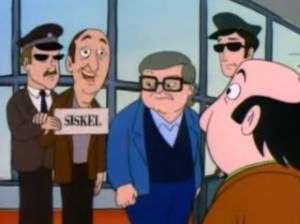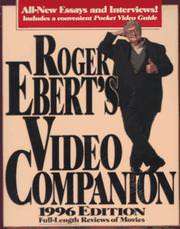In Memoriam: Roger Ebert
Death of a critic

The late Roger Ebert's writing would have left a mark if he had never gone on television in his life, but it was his TV show with Gene Siskel that made him a celebrity. You wouldn't have expected that from their first episode: two writers droning on, not always sure where exactly they should be looking, with no excitement beyond the possibility that Siskel's 'stache will start eating his face. But it wasn't long before they perfected the bickering-brothers dynamic that made their show more entertaining than at least 60% of the movies they reviewed. Instead of suppressing their offscreen rivalry, which is on display in various outtakes floating around the Web, they channeled it into arguments about movies; and they made those arguments meaningful by actually giving a damn about the pictures they were rating. They also had a healthy sense of self-aware humor about their personas, as their inevitably entertaining guest spots on Letterman and other shows proved. The act could be imitated but it could never be equaled, as countless other programs -- including, eventually, Ebert & Roeper -- would learn.

But if the TV show ensured that Roger Ebert was famous while he was alive, it's his writing for newspapers and the Web that should ensure he'll be remembered long after he's dead. For one thing, he was an exceptional stylist. I might disagree strenuously with Ebert's opinion about a movie; I might bristle at a factual flub or two about the plot; but I was almost always awed at his prose, which was thoughtful, graceful, funny, and accessible.
He didn't just write about movies. He had been a sportswriter early on, and an interview he did for his college paper with the left-libertarian author Paul Goodman was good enough to get reprinted in one of Goodman's books. (He invoked Goodman in at least one of his reviews too -- a thumbs-up take on Paul Schrader's underappreciated Blue Collar -- and there was a time when I had hopes that underneath it all Ebert was some sort of anarchist. Alas, when he unleashed his political-pundit side late in life he turned out to be a standard-issue liberal.) In his last few years he wrote many wonderful memoirs for his website, and then a much-admired autobiography. But of course it was his movie writing that defined him, and it was here that he made his other great contribution to American culture.
Ebert, you see, didn't care about those old highbrow/middlebrow/lowbrow distinctions that occupied so many debates about criticism in the middle of the 20th century. If you were interested in learning about cinema as a high art, he could be your gateway to the greats, writing ably about Bergman and Welles and Kurosawa and other filmmaking giants. (I'm pretty sure I first heard of Fassbinder in a Roger Ebert essay. Or, at least, that essay was the first time I wanted to run out and rent a Fassbinder movie right away.) On the other hand, if you wanted to know if the latest spy flick was exciting or if the new Mel Brooks movie was likely to make you laugh, Ebert was perfectly willing to wax enthusiastic about those kinds of films too. It's not that he liked everything, you understand. (Check out his evisceration of Priest.) It's that he was capable of liking everything, or at least everything that was done well. Even when he joined in the chorus denouncing the slasher genre in the '80s, he had to confess that yes, he was the guy who gave three and a half stars to Last House on the Left.

And that leads us to what may be my all-time favorite Roger Ebert review: a joyful little essay about the pleasures to be found in even the most indefensibly trashy pictures. The subject is a blink-and-you'll-miss-it release called Rapa Nui. I've never seen it, and I don't think I even would have heard of it if I hadn't read Ebert's review. He gives it just two stars, and much of the piece consists of a litany of everything ridiculous about the picture. But then he says this at the end:
Concern for my reputation prevents me from recommending this movie. I wish I had more nerve. I wish I could simply write, "Look, of course it's one of the worst movies ever made. But it has hilarious dialogue, a weirdo action climax, a bizarre explanation for the faces of Easter Island, and dozens if not hundreds of wonderful bare breasts." I am however a responsible film critic and must conclude that "Rapa Nui" is a bad film. If you want to see it anyway, of course, that's strictly your concern. I think I may check it out again myself.
My head can't bring itself to believe in an afterlife. But my heart hopes that Ebert gets another chance to see it.


Show Comments (49)